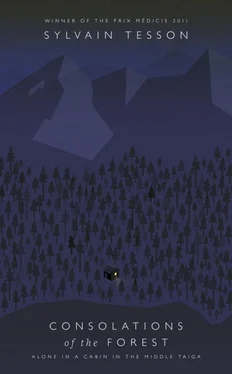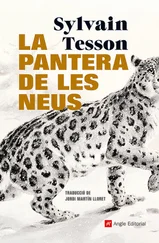The small pavilion can barely fit a bed in lengthwise
pouring myself drinks all day I watch the mountains
admirable when in the night the wind flies in with rain
amid drunkenness the noise knocks on the window pane in vain.
30 MARCH
I hot-footed it up to the ice waterfall today via a new route. I take the first valley to the south of my cabin and at 3,280 feet I begin working my way all around the shoulder. I pass the ridge and a few sentinels of rotten granite looming up through the snow. I continue along the flank of the slope on the hard snow, occasionally tripped up by a stretch of dwarf pines. It takes me five whole hours of hard labour to reach the left bank of the notch cradling the ice waterfall. My secret hope, in staying so long above the treeline, is to catch sight of a deer, but aside from some wolverine tracks disappearing into the woods and which fill me with joy, there is nothing.
Back at the lake, I catch my first fish at five o’clock. A second one three minutes later, and a third an hour and a half after that. Three quicksilver char, electric with fury, gleam on the ice. Their skin is shot through with quivers of energy. I kill them and look out at the plain, murmuring the words of thanks Siberians once addressed to the animal they had destroyed or the world they had just made a little poorer. In modern society, the carbon tax has replaced this ‘Thank you, I’m sorry.’
The happiness of having on your plate the fish you’ve caught, with a glass of water you’ve fetched, and the wood you’ve chopped in the stove: the hermit goes to the source. The flesh, water and wood are still fresh.
I remember my days in the city. I’d go down to shop for supper and wander along the aisles of a supermarket, glumly tossing items into my trolley. We’ve become the hunter-gatherers of a denatured, unnatural world.
The urban liberal, leftist, revolutionary and upper-middle-class citizen all pay money for bread, gas and taxes. The hermit asks nothing from the state and gives nothing to the state. He disappears into the woods and thrives there. His retreat constitutes a loss of income for the government. Becoming a loss of income should be the objective of true revolutionaries. A repast of grilled fish and blueberries gathered in the forest is more anti-statist than a protest demonstration bristling with black flags. Those who dynamite the citadel need the citadel. They are against the state in the sense that they lean against it. Walt Whitman: ‘I have nothing to do with this system, not even enough to oppose it.’ On that October day five years ago when I discovered old Walt’s Leaves of Grass , I had no idea that reading it would lead me to a cabin. It’s dangerous to open a book.
A retreat is a revolt. Entering one’s cabin means vanishing from surveillance screens. The hermit erases himself. He sends no more numeric traces, no telephonic signals, no banking data. He divests himself of all identity. He effects a kind of reverse hacking, and leaves the Great Game. No need, moreover, to head for the woods. Revolutionary asceticism can adapt to an urban milieu. The consumer society offers the choice to conform to it, and with a little discipline… Surrounded by abundance, some are free to live like pushovers but others may play the monk and stay lean amid the murmur of books, retreating to inner forests without leaving their apartments. In a society of penury, there is no other alternative. One is condemned to a state of want, and conditioned by it. Willpower is neither here nor there. A famous Soviet joke says a guy goes into a butcher shop and asks: ‘You have any bread?’ Answer: ‘Ah, no, this is the place where we have no meat, so for the place where they have no bread, go next door to the bakery.’ The Hungarian lady who raised me taught me such things and I often think of her. The consumer society is a somewhat vile expression, born of the phantasm of childish grown-ups disappointed at having been too spoiled. They haven’t the strength to reform on their own and dream of being constrained to live in sober moderation.
At seven this evening, I attempt to make myself blini with my stash of flour kept in watertight bags. An hour later I place on my wooden plank a single charred pancake. I spend a half-hour outside until the smoke is gone from the cabin, then open a packet of Chinese noodles.
31 MARCH
For a few days now, I’ve been conducting a Pavlovian experiment that is beginning to bear fruit. At nine in the morning, I play a tune on my flute at the window before tossing some crumbs to the titmice. This morning they arrived at the first notes, well before I’d set out their ration. I breathe deeply of the dawn air, surrounded by birds. The only thing missing is Snow White.
A day up in the heights. I head back up the ‘white valley’, a large combe filled with Japanese larches to the north of my cabin. After five hours of struggle in the deep snow I reach 5,250 feet. Sometimes I feel like a moose stuck up to the chest in glue. I think I’m about 980 feet from the summit, but it’s very cold and getting late. I head down to North Cedar Cape. Some lynx tracks cross my own. The animal must have passed by one or two hours earlier and still be somewhere in the vicinity. I bend down to sniff the paw prints but can’t smell a thing. I feel less alone. There were two of us traipsing around the neighbourhood today.
This evening, I split some wood in the clearing. First you must put the cleaving axe deep into the wood with a powerful blow. Once the metal is deeply set, you raise the axe and the log it’s stuck in – and whack the whole thing with all your strength down on the chopping block. If the blow is well struck, the log splits in two. Then all you have to do is lop off smaller pieces with a hatchet. My aim is true; I’m no longer missing my target. A month ago, it took me three times as long to prepare the necessary firewood. In a few weeks, I’ll be a chopping machine. When the metal strikes exactly where it should and the logs split with a ripping sound, I convince myself that cutting wood is a martial art.
1 APRIL
It’s nine in the morning. I’m reading Michel Déon’s novel about a man who withdraws to the Irish countryside, where the people are passing strange, when I come upon these words: ‘But you know, in spite of all my willpower, solitude is the most difficult thing to protect’ – and my door flies violently open. Displaying typically Russian energy, four fishermen burst into the cabin without warning, as if they intended to beat me senseless.
They bellow exuberant greetings. They’re driving to Severobaikalsk, a large town on the northern end of Lake Baikal, to sell the fish they’ve caught in the southern sector of the reserve. I hadn’t heard their truck engine and in my fright have spilled my tea all over Un taxi mauve . There’s Sasha, who’s missing some fingers; my old acquaintance Igor (also missing some digits), whom I met five years ago out on the ice; Volodya T., whose former cabin I now inhabit; and Andrei, a Buryat I’ve never seen before. I perform the ritual: slice up the sausage they’ve placed on the table, open a bottle, bring out the glasses. Two of my visitors abstain, but the rest of us set about getting drunk.
I ask each of them to tell me how he spent his military service. Volodya was in a tank in Mongolia (a toast to tank crews); Sasha was a radio operator on the shores of the Arctic Ocean (a toast to those Arctic shores); Igor, a sailor in the Crimea (a toast to the fleet); and Andrei, a gunner in Cherkasy, in central Ukraine (a toast to the Russian politics of pacification in the Caucasus). The postings of Russian conscripts form a trans-Siberian journey to rival the one in Blaise Cendrars’s modernist poem about his Russian travels in 1905. My camera is in position on the shelf; I press the button. The conversation grows livelier, fuelled by the bite of Kedrovaya vodka in a 104°F cabin.
Читать дальше












